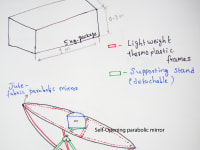Globally, more than 3 billion people depend on biomass to meet their basic energy needs for cooking, boiling water, lighting, and space-heating. The use of these solid fuels on open ?res or inef?cient stoves results in large amounts of a range of health-damaging pollutants, often under conditions of poor household ventilation. It primarily affects developing countries, but marginalized populations in industrialized countries may also be concerned. Women and young children, who may spend many hours in the vicinity of the smoky hearth, are most at risk. On the other hand, it leads to a high level of deforestation, promoting global warming.
Solar cooking is the simplest, safest, most convenient way to cook food without consuming fuels or heating up the kitchen. Many people choose to solar cook for these reasons. But for hundreds of millions of people around the world who cook over fires fuelled by wood or dung, and who walk for miles to collect wood or spend much of their meagre incomes on fuel, solar cooking is more than a choice — it is a blessing.
However, manufacturing of the stable parabolic solar cooker involves much cost which is around 160 USD. Hence, it is being not preferred by larger communities who use fuel-wood for their daily needs. Our proposed parabolic solar cooker costs just 60 USD for the whole setup. Moreover it is highly flexible and lightweight, hence can be carried along during the move. We achieve this with a specially designed textile fabric made out of Jute fibre. This makes the cooker sustainable.
Self-opening Parabolic Mirror is made of conventional double woven fabric. Its shape will be kept in position by using flexible stringers (tent principle) and the sun radiation is collected by using a reflecting foil, covering the surface.
These materials are a lot cheaper, more sustainable and easier to handle, than the existing parabolic reflectors made from, glass mirrors or polished metal sheets. For the end-user it is easier to build the cooker and no additional tools are needed.
The woven fabric is foldable, like the reflecting foil. With the flexible stringers and the detachable stand it can be packed very compact, to move it or send it anywhere and its water-resistant.
The technology to produce our parabolic mirror consumes less energy and is available in a lot of emerging nations, so the benefit of the cooker is pushing their own economies. It’s easy to vary the size of the parabolic woven in production, so it can easily be customized to the required size, from an espresso boiler to a canteen- kitchen.
The stable stand guarantees a safe handling of the hot cooking pots and pans. Its basic construction is self-explanatory to everybody or through simple figures.
No special pots are needed. People can use their old ones. The parabolic mirror itself is highly energy efficient in terms of its effectiveness in collecting the solar energy. Still the efficiency can be improved by blackening the bottom of the pot with charcoal or carbon-black.
Like this entry?
-
About the Entrant
- Name:Sathis Kumar Selvarayan
- Type of entry:teamTeam members:Raphael Geiger
- Patent status:none





